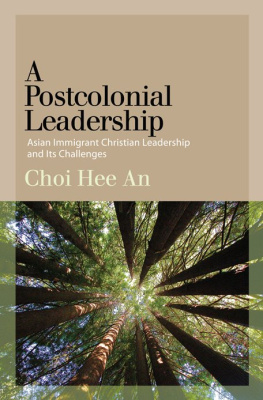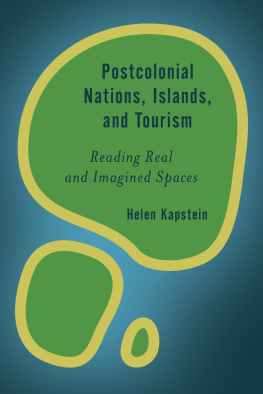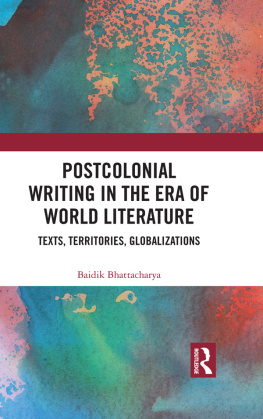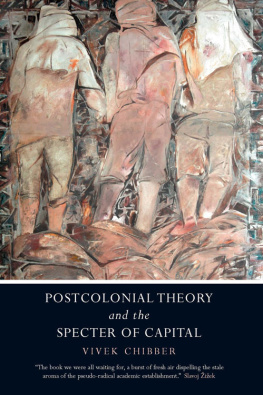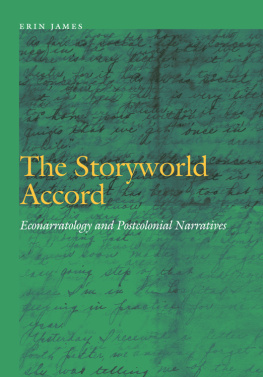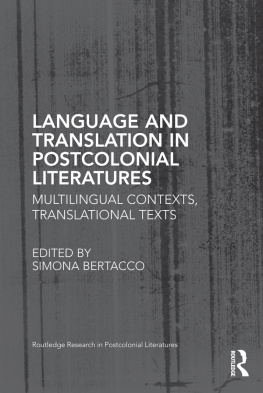Postcolonial Parabola
Postcolonial Parabola
Literature, Tactility, and the Ethics of Representing Trauma
Jay Rajiva
Bloomsbury Academic
An imprint of Bloomsbury Publishing Plc

Contents
Sincere thanks to Mari Ruti, Uzoma Esonwanne, and the late Chelva Kanaganayakam for their constructive criticism and lasting commitment to the project. Feedback from Rosemary Jolly and Sara Salih helped me develop the book into publishable form. Carol Percy, Neal Dolan, and Francis Cody taught seminars in which I drafted work that eventually surfaced in this book. Nick Mount, Neil ten Kortenaar, Colin Hill, Michael Johnstone, and Elizabeth Harvey contributed to my professional development. Gratitude to Phil Dickinson, Sundhya Walther, Miriam Novick, Morgan Vanek, Aaron Heisler, Ricky Varghese, Kathleen Ogden, Kaelyn Kaoma, and Andrea Charise. Special thanks to Margaret Herrick for being a wonderful friend and academic kindred spirit.
I want to thank the faculty and staff in the English Department at Georgia State University, particularly Calvin Thomas, Randy Malamud, Lindsey Eckert, Audrey Goodman, Lyne Lewis Gaillet, Matthew Roudan, Mark Noble, Tanya Caldwell, Angela Christie, Eddie Christie, Chris Kocela, Robin Wharton, Marta Hess, Ben Miller, Pearl McHaney, and Rene Schatteman. Thanks also to Nathan Suhr-Sytsma (Emory) for mentoring and support.
This book has been partially funded by a Summer Research Award (GSU English, 2016).
A draft of the Chapter-3 section on Mark Behrs The Smell of Apples was previously published in an issue of Research in African Literatures (44:4, 2013). It appears here in revised form with the kind permission of the editors.
Thanks are due to the staff at Bloomsbury: Haaris Naqvi, Katherine De Chant, Mary Al-Sayed, Kalyani, and James Tupper. Thanks also to Andy Fentem, my research assistant for 201516, and to Guneeta Singh Bhalla and Elaine Jones at the 1947 Partition Archive in Berkeley, California.
My parents, sisters, and brothers-in-law deserve mention for their unconditional love and support.
Lastly, I have no words to express the love and gratitude I feel for my partner, Simone Taylor, and my daughter, Sujatha Taylor. I wrote this book with their presence in my heart.
To write in the space marked by the postcolonial is, in a sense, already to encounter trauma, not only because postcolonial experience itself is frequently traumatic, but also because the very word itself suggests a division that remains unresolved: what was once colonial is now post, but so close to its past that moving forward seems fraught with difficulty, as is so often the case with trauma. Postcolonial literature, written back to the former colonizing countries, aims to represent the lived experience of the colonized or recently decolonized. The terms meaning, though, is never quite certain. In many cases, we wonder if political independence truly means that harmful colonial practices are at an end. We question whether forms of neocolonialism are conspiring to sabotage a newly sovereign nations self-sufficiencyundermining the post in the word itself. We say postcolonial hesitantly, doubling back on ourselves in the very act of saying, wondering how much we have left unsaid. But one common thread binds postcolonial literature together: the representation of the historical, cultural, and political process of decolonization as a traumatic event that has a profound and lasting impact on the lives of postcolonial subjects.
So we return, uneasily, to the postcolonial, to the split within both word and world. This internal contradiction, this recurring pulse, dramatizes the terms difficulty: vexed, insistent, never at rest. I use the term postcolonial literature consistently throughout this book. I do so for clarity of expression and ease of reading, not to homogenize experience or foreclose further interrogation of the word. Postcolonial experience has been and will continue to be contested, necessarily so. This continual tension might seem exhausting; I suggest instead that it is exhilarating, the vital evidence of critical inquiry. When I append the term trauma to the word postcolonial, though, a series of questions might arise. Why talk about trauma, and postcolonial trauma in particular? Why is literature the most suitable vehicle for representing postcolonial trauma? And finally, what is the specific nature of the readers encounter with literary representations of postcolonial trauma?
Just as the term postcolonial suggests an inherent division, trauma literature is riven by the trauma it seeks to represent and the genre in which this representation finds voice. Trauma, Laurie Vickroy writes, is an ancient human phenomenon, but trauma literaturethat is, literature written with a conscious awareness of the concepthas become a kind of contemporary genre (2015: 3). Studying trauma literature and the literatures historical origin share a convergence: the postWorld War II period, in which instances of extreme collective violence have given us a paradigm for applying the term trauma to literature from a wide range of regions and cultural traditions. Trauma theory, in other words, entered public consciousness as part of a drive to understand the kind of shell shock that affected so many soldiers during World War I, and later developed in relation to other wars that followed in the course of the twentieth century (Alexander et al., 2004: 4). This focus, though, indicates a collective experience, vaulting trauma out of solipsismones personal trauma onlyand into a wider community spread across lines of space, culture, and history. Whether we refer to the trauma of living through collective violence, environmental disaster, migration and diaspora, colonization, rape culture, or systemic poverty, we describe a collective experience that shapes the trauma of the individual. The contemporary moment, then, promotes a recognition of traumas ubiquity not merely as an occurrencean event or series of events with bounded, measurable effectsbut as an ongoing cultural phenomenon that demands radical adjustments in how one lives in and moves through the world. The narration of this traumatic experience, with varying degrees of candor and self-consciousness, signals what we know today as a trauma text.
Given the rise of trauma literature as a distinct literary genre, one might expect to be able to determine a works status as a trauma text according to a relatively stable set of formal characteristics. However, the peculiar problem of trauma literature is that many of its criteria are at once easy to describe and difficult to organize into a coherent pattern.text, nor are they exclusive to trauma literature as a category. So were left with the question: why is it helpful to describe a work of literature as a trauma text? What do we gain by talking about this seemingly amorphous genre called trauma literature?
To answer these questions, I turn to literatures unique capacity for accessing certain forms of human experience. For example, living with the pervasive effects of class oppression might generate an everyday traumatic experience that demands a historical or cultural account of the traumas origination, an account that exceeds scientific research and courtroom testimony in its use of imagination as a conceptual basis for understanding. Living with trauma means inhabiting an experience that is both intensely present and elusive within rational and empirical frameworks of assessment. Working through trauma, then, is not a logical, transparent process with a clear objective, but rather a messy endeavor marked by the sustained, imaginative reformulation of ones mode of understanding. Imagination, in other words, is crucial to coping with traumas complexity. Correspondingly, empathythe imaginative recognition of and respect for traumatic experience that is not ones ownis an ethically necessary part of writing about trauma (LaCapra, 2001: 40). Enter literature as a method of accessing traumatic experience, a form whose very mode of representation hinges on the imaginative retelling of a traumatic event, with all its contradictions and complexities. More: it is a form frequently resistant to (and perhaps even suspicious of) premature or facile closure, in which the complexity of traumatic experience is secondary to the readers desire to escape or neatly resolve the trauma at hand. At its most vital, literature can keep this type of unearned closure at bay, furnishing the reader with a multidimensional, immersive experience of trauma that lasts beyond the time of reading. Literature, in other words, can enrich our ideas of what it means to live through trauma of any kind.


